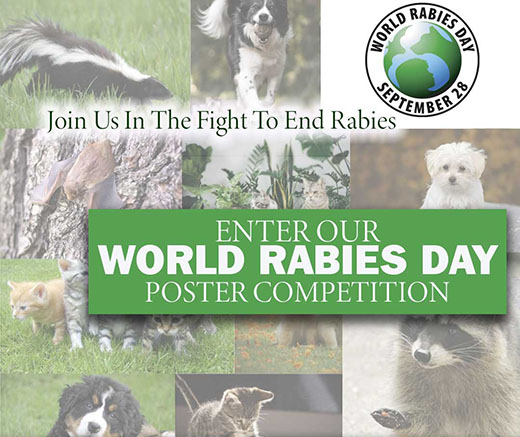Kansas State Veterinary Diagnostic Laboratory promotes rabies awareness
Wednesday, Sept. 27, 2023
MANHATTAN — In commemoration of World Rabies Day on Sept. 28, the Kansas State Veterinary Diagnostic Laboratory is shedding light on the relentless battle against rabies, an ongoing global public health threat.
"This year, we proudly embrace the 2023 theme of World Rabies Day: All for One and One Health for All," said Janine Seetahal, director of the Kansas State Veterinary Diagnostic Laboratory's Rabies Laboratory. "Rabies is a significant public health concern globally. It is a deadly viral disease that affects mammals, including humans, and is responsible for an estimated 59,000 deaths worldwide each year."
While human rabies is preventable, Seetahal said it still persists in many parts of the world, primarily affecting vulnerable communities with limited access to healthcare and veterinary services.
"In the United States, although human cases are much less common, wildlife — such as skunks, raccoons and bats — serves as potential reservoirs for the transmission of the virus to humans," Seethal said. "The 'One Health' approach underscores the interconnectedness between people, animals and their shared environment. Rabies serves as a poignant example of why this approach is crucial."
The laboratory is hosting a poster competition, which is open to Kansas students in grades K-12, with prizes that will be awarded to participating schools and students in four grade-level categories. Visit the poster competition webpage for the full contest rules and a link for submitting entries. The entry deadline is Dec. 22.
 "Many children, as well as many people in the wider community, are not aware of the risk of rabies associated with wildlife contact and the preventative measures that can be taken to protect themselves and their families," Seetahal said. "By engaging students in creating informative posters, we aim to promote active learning and foster the development of their knowledge and understanding of rabies prevention while encouraging creativity and participation."
"Many children, as well as many people in the wider community, are not aware of the risk of rabies associated with wildlife contact and the preventative measures that can be taken to protect themselves and their families," Seetahal said. "By engaging students in creating informative posters, we aim to promote active learning and foster the development of their knowledge and understanding of rabies prevention while encouraging creativity and participation."
According to Seetahal, the rabies virus can infect both domestic and wild animals, posing a threat to human health through animal bites and scratches from infected animals.
"While vaccination of domestic animals is possible and acts as a defense line against transmission to humans, wildlife vaccination programs are not as straightforward and requires a more population-based approach," Seetahal said. "Rabies is also more prone to emerge in wildlife in areas under anthropogenic influence with imbalances in the ecosystem. Through a collaborative One Health strategy that addresses this problem from different approaches, together we can effectively control and prevent the emergence and spread of rabies."
The K-State Rabies Lab is partnering with Bavarian Nordic, the Kansas Department of Health and Environment, the One Health Commission Bat Rabies Education Team and K-State Extension Wildlife Management, which provide input and collaboration from the human health and environmental sectors for the poster competition.
